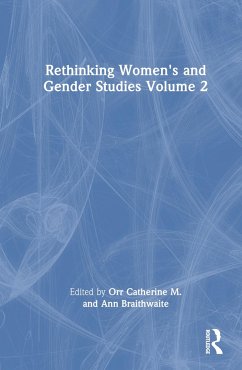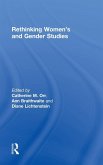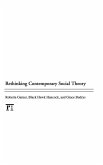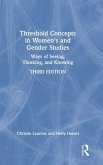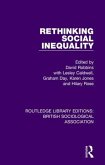Rethinking Women's and Gender Studies Volume 2
Herausgeber: Orr, Catherine M.; Braithwaite, Ann
Rethinking Women's and Gender Studies Volume 2
Herausgeber: Orr, Catherine M.; Braithwaite, Ann
- Gebundenes Buch
- Merkliste
- Auf die Merkliste
- Bewerten Bewerten
- Teilen
- Produkt teilen
- Produkterinnerung
- Produkterinnerung
The second volume of Rethinking Women's and Gender Studies addresses the complexities and inherent paradoxes of the expansive knowledge project known as Women's and Gender Studies for audiences both inside and adjacent to the field.
Andere Kunden interessierten sich auch für
![Rethinking Women's and Gender Studies Rethinking Women's and Gender Studies]() Rethinking Women's and Gender Studies188,99 €
Rethinking Women's and Gender Studies188,99 €![Rethinking Contemporary Social Theory Rethinking Contemporary Social Theory]() Roberta GarnerRethinking Contemporary Social Theory222,99 €
Roberta GarnerRethinking Contemporary Social Theory222,99 €![Threshold Concepts in Women's and Gender Studies Threshold Concepts in Women's and Gender Studies]() Christie LauniusThreshold Concepts in Women's and Gender Studies193,99 €
Christie LauniusThreshold Concepts in Women's and Gender Studies193,99 €![Rethinking America Rethinking America]() Jeff MaskovskyRethinking America222,99 €
Jeff MaskovskyRethinking America222,99 €![Rethinking Disability, Care, and Motherhood Rethinking Disability, Care, and Motherhood]() Priyasha ChoudharyRethinking Disability, Care, and Motherhood176,99 €
Priyasha ChoudharyRethinking Disability, Care, and Motherhood176,99 €![Rethinking Social Inequality Rethinking Social Inequality]() Rethinking Social Inequality131,99 €
Rethinking Social Inequality131,99 €![Rethinking Sports and Integration Rethinking Sports and Integration]() Sine AgergaardRethinking Sports and Integration68,99 €
Sine AgergaardRethinking Sports and Integration68,99 €-
-
-
The second volume of Rethinking Women's and Gender Studies addresses the complexities and inherent paradoxes of the expansive knowledge project known as Women's and Gender Studies for audiences both inside and adjacent to the field.
Produktdetails
- Produktdetails
- Verlag: Routledge
- Seitenzahl: 386
- Erscheinungstermin: 23. November 2023
- Englisch
- Abmessung: 240mm x 161mm x 25mm
- Gewicht: 743g
- ISBN-13: 9781032593760
- ISBN-10: 1032593768
- Artikelnr.: 68476536
- Herstellerkennzeichnung
- Libri GmbH
- Europaallee 1
- 36244 Bad Hersfeld
- gpsr@libri.de
- Verlag: Routledge
- Seitenzahl: 386
- Erscheinungstermin: 23. November 2023
- Englisch
- Abmessung: 240mm x 161mm x 25mm
- Gewicht: 743g
- ISBN-13: 9781032593760
- ISBN-10: 1032593768
- Artikelnr.: 68476536
- Herstellerkennzeichnung
- Libri GmbH
- Europaallee 1
- 36244 Bad Hersfeld
- gpsr@libri.de
Catherine M. Orr, Ph.D., is Professor Emerita in Critical Identity Studies at Beloit College, where she worked for 22 years. She is co-editor of Rethinking Women's and Gender Studies (Routledge 2012), co-author of Everyday Women's and Gender Studies (Routledge 2017), and has published in Souls, Atlantis, Feminist Studies, NWSA Journal, Women's Studies Quarterly, and Hypatia. She served as Conference Chair (2006-08) and Conference Co-Chair (2012-14) in the National Women's Studies Association (NWSA) and held a number of leadership positions on the organization's General Council. Her scholarship, teaching, and professional development have always been about interrogating the contradictions of cultural and institutional histories, especially those in which she feels deeply implicated. She now works as a DEI consultant, serves on the board of Urban Triage in Madison, Wisconsin, and has become a passionate mixed-media artist who translates complexities about whiteness and its histories of violence to new audiences. Ann Braithwaite, Ph.D., is Professor and Coordinator of Diversity and Social Justice Studies at the University of Prince Edward Island. The co-author or co-editor of three books (Troubling Women's Studies, Sumach Press / CPSI 2005; Rethinking Women's and Gender Studies, Routledge 2012; Everyday Women's and Gender Studies: Introductory Concepts, Routledge 2017), Dr. Braithwaite's scholarly work examines the ways in which disciplines reflect a set of embedded ways of knowing, asking how these citational practices shape any field and elaborating on how attending to those questions matters. Both at UPEI and beyond, her passion is to engage others in exploring how to bring questions of inclusion and justice to the classroom and to curricular programming. She is the recipient of numerous teaching, educational leadership, and service awards at UPEI, including the 2014 AAU Anne Marie MacKinnon Educational Leadership award, and is a 2021 STLHE / SAPES 3M National Teaching Fellow.
Introduction: Why Rethink Women's and Gender Studies Now? Section 1:
Foundational Assumptions 1. Indigenous Feminism 2. Femininity 3.
Citizenship 4. Inclusion 5. Intersex 6. Expertise Section 2. Ubiquitous
Descriptions 7. Belonging 8. The Ph.D. 9: Nation 10. Women 11. Innocence
Section 3. Epistemologies Rethought 12. Genealogy 13. Generation 14.
Critical 15. Choice 16. Self-Care 17. Consent Section 4. Silences and
Disavowals 18. Settler Colonialism 19. Asexuality 20. Cis 21. Disability
22. Nonhuman Animals Section 5. Establishment Challenges 23. Humanitarian
24. Sexual Violence 25. The Gaze 26. Transdisciplinarity 27. Transformation
28. Branding Conclusion: Continuing the Conversation Works cited Index
Foundational Assumptions 1. Indigenous Feminism 2. Femininity 3.
Citizenship 4. Inclusion 5. Intersex 6. Expertise Section 2. Ubiquitous
Descriptions 7. Belonging 8. The Ph.D. 9: Nation 10. Women 11. Innocence
Section 3. Epistemologies Rethought 12. Genealogy 13. Generation 14.
Critical 15. Choice 16. Self-Care 17. Consent Section 4. Silences and
Disavowals 18. Settler Colonialism 19. Asexuality 20. Cis 21. Disability
22. Nonhuman Animals Section 5. Establishment Challenges 23. Humanitarian
24. Sexual Violence 25. The Gaze 26. Transdisciplinarity 27. Transformation
28. Branding Conclusion: Continuing the Conversation Works cited Index
Introduction: Why Rethink Women's and Gender Studies Now? Section 1:
Foundational Assumptions 1. Indigenous Feminism 2. Femininity 3.
Citizenship 4. Inclusion 5. Intersex 6. Expertise Section 2. Ubiquitous
Descriptions 7. Belonging 8. The Ph.D. 9: Nation 10. Women 11. Innocence
Section 3. Epistemologies Rethought 12. Genealogy 13. Generation 14.
Critical 15. Choice 16. Self-Care 17. Consent Section 4. Silences and
Disavowals 18. Settler Colonialism 19. Asexuality 20. Cis 21. Disability
22. Nonhuman Animals Section 5. Establishment Challenges 23. Humanitarian
24. Sexual Violence 25. The Gaze 26. Transdisciplinarity 27. Transformation
28. Branding Conclusion: Continuing the Conversation Works cited Index
Foundational Assumptions 1. Indigenous Feminism 2. Femininity 3.
Citizenship 4. Inclusion 5. Intersex 6. Expertise Section 2. Ubiquitous
Descriptions 7. Belonging 8. The Ph.D. 9: Nation 10. Women 11. Innocence
Section 3. Epistemologies Rethought 12. Genealogy 13. Generation 14.
Critical 15. Choice 16. Self-Care 17. Consent Section 4. Silences and
Disavowals 18. Settler Colonialism 19. Asexuality 20. Cis 21. Disability
22. Nonhuman Animals Section 5. Establishment Challenges 23. Humanitarian
24. Sexual Violence 25. The Gaze 26. Transdisciplinarity 27. Transformation
28. Branding Conclusion: Continuing the Conversation Works cited Index

